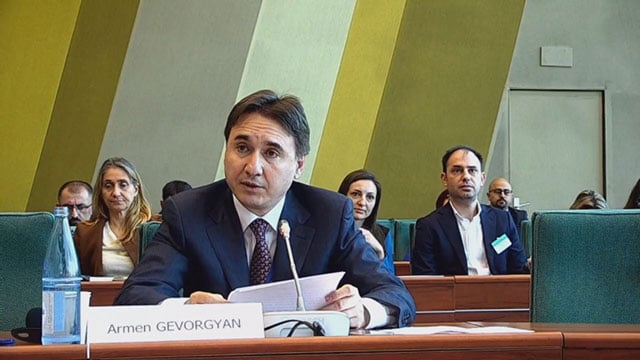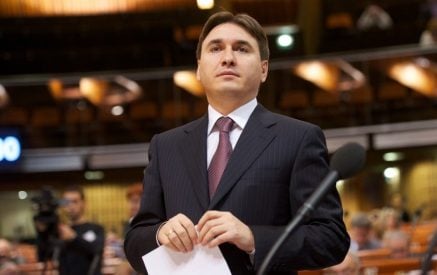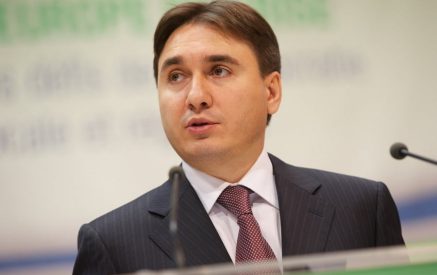On November 8, the Member of the RA NA Delegation to PACE, the key rapporteur on PACE Local and Regional Authorities Armen Gevorgyan gave a speech in the 10th World Forum for Democracy held in Strasbourg.
“ Distinguished participants,
The developments of the past decade allow me to say that the free world now faces fateful choices for the maintenance and development of democracy. Such choices will either lead to firmly upholding our democratic principles and traditions, or more clearly condoning democratic backsliding and faking principles almost everywhere. Let me continue by listing five, I think, key aspects that negatively affect democratic governance and discourage full-scale civic engagement.
1. Progressive decline in positive expectations among citizens,
Read also
2. Continuing erosion of values and ideals of free world, and spread of double standards across Europe,
3. Accelerating disengagement of people on state level, and reducing civic participation to local level alone.
4. Deepening social divide due to the difficulties for equal access to quality education.
5. Unhindered rise of populist leaders along with a disturbing level of manipulations and misinformation in social networks.
Today I will offer my observations on the first three issues and will be glad if these can be a useful input in our discussion.
So, what has triggered the progressive decline in positive expectations among citizens?
First and foremost, I think this is caused by the quality and content of the political activism of modern elites. Unfortunately, today in many European states a lot of people live with thoughts not about better education or health care, but about how not to lose jobs or avoid freezing.
We all live in anticipation of the Third World War or a nuclear disaster. The decline in levels of happiness and welfare result in less engagement, less democracy and less security in the world. In non-European perspective the question “What is Europe?” most likely yields to three main answers: welfare, justice and security.These three issues also make Europe a unique continent and that attracts migrants from all over the world. Now all these virtues of the free world are under question – and not because of international situation, but also caused by setbacks from democratic principles in Europe.
What has caused the continuing erosion of values and ideals of free world?
In the current international confrontation, the democratic traditions and values of the free world have begun to be neglected because of geopolitical interests. This has triggered the discourse about double standards, and has negatively affected the soft power of our values in the world.
Some people think that strong and uncompromising position adopted by Europe in the Ukraine crisis is a good signal to many that ideals and values matter. But that’s not a principled position in other cases. We must break the chain of continuous compromises towards non-democratic and illiberal regimes to maintain commitment to our values everywhere. Such “double standards” are most vividly being manifested in selective attitudes towards, for example, restrictions on freedom of speech, consistent pressures on the courts, or the recognition of fundamental right of peoples to self-determination. Such “ double standards ” are also manifested when Europe demonstrates selective approaches towards aggression and military occupation of sovereign lands, only because of energy security concerns.Let’s face the reality: according to the Economist Intelligence Unit the Council of Europe comfortably houses both mature democratic countries and younger authoritarian regimes.
How do I detect accelerating disengagement of people on state level?
There are three dimensions for civic engagement in Europe: local, national and supra-national environments. In local level we see most advanced and exquisite democratic mechanisms in action. In some countries we observe emergence of “mock democratic regimes” where people only vote on national election day – and that’s it. How shall we call the political majority, which earned its votes in free elections, but then implements policies that have nothing to do with their campaign pledges or electoral platforms?
It may seem that “ a new normal ” is when fateful decisions are made by governments without any meaningful participation of the people – for example, about amending the neutrality status of the state, or changing the head of government a few times in a row without new elections. There are many other examples, such as establishing new political unions, new military forces on the continent, etc.
How shall we treat the situation when politicians decide what information European shall receive and how much of it? Access to information that has great impact on people’s lives is often being restricted by the decision of politicians. Are explanations about “national security concerns” just enough?
Colleagues,
To conclude, let me say the following:
Contradictory processes on different levels of democratic governance may undermine the very foundations of social trust and stability. An alarm call about the low public approval about the system of governance must be the currently declining levels of turnout in elections. We must disrupt the chain of compromises, mentioned earlier, before it cancels prosperity and security in Europe. To do that we have to reinvent ourselves and yet again become more principled to avoid falling victim of current authoritarian trends. ”
National Assembly of the Republic of Armenia





















































